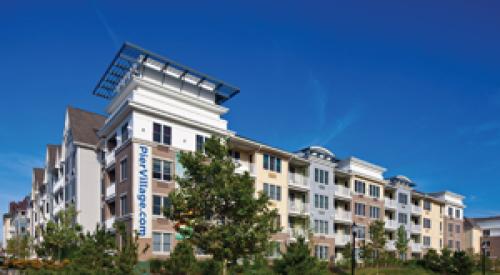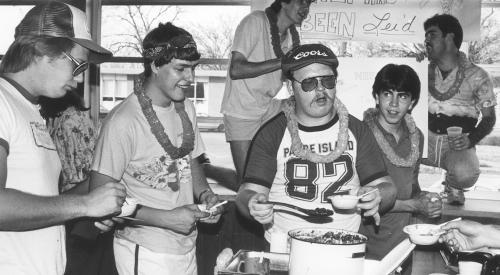|
What makes a good workplace? And why should you care? Maybe keeping afloat is all you feel you can focus on right now. Perhaps you think employees expect too much already: a decent salary, safety on the job site, a pat on the back here and there. What more could they expect?
There was a time when the basics were enough. But Generation X and echo boomer employees in particular have changed the landscape by expecting more from their jobs and careers: work/life balance, opportunities for personal development, an open door policy with management and a corporate commitment to social responsibility. Boomers are embracing these priorities, wanting fulfilling work without spending 60 hours a week at their jobs.
Professional Builder's 2007 Best Workplaces have achieved something phenomenal. At a time when the home building industry has taken a major hit in terms of revenues and when the mainstream media is predicting the industry to get worse before it gets better, employees at these companies tell us they are happy with their jobs and trust their senior management's leadership — and nearly three quarters of them say they believe they will be working for their current employer two years from now.
Builder companies that keep the focus on what several of our winners have described as their most valuable asset — their employees — have a competitive edge sorely needed in this market: employees who are loyal, hardworking and productive. If you give them your best, they'll return the favor.
FaxonGillis Homes outside Memphis, Tenn., is our top-ranked Best Workplace, which is laudable because of its size and the fact that it is not well-known outside of its local market (FaxonGillis also made its debut on PB's Giant 400 list this year, coming in at No. 385).
FaxonGillis, with 31 employees, $35.5 million in 2006 revenues and 158 closings, and No. 2 Generation Homes, with 36 employees, $37 million and 96 closings, demonstrate you don't need the resources of a typical giant builder to provide a great workplace.
Though our rankings reflect overall scores for all five companies —FaxonGillis Homes, Generation Homes (Ranked at No. 2), John Laing Homes (No. 3), Winchester Homes (No. 4), and Pardee Homes (No. 5) — individual companies scored high in particular areas. For example, Generation Homes scored highest in satisfaction with opportunities for advancement and career development — almost 82 percent versus an average score among all respondents of 54.5 percent (a score of 82 percent indicates that 82 percent of company employees that responded to the survey strongly agreed with a particular statement. For more details see Methodology).
|
Online Exclusive: We asked each of the Best Workplaces Winners to send us photos that demonstrated what made their company a great place to work. View their photo albums:
Topline results of the online survey for Professional Builder's Best Workplaces 2007 are available: |
John Laing Homes scored highest — 78.6 percent — on satisfaction with opportunities for personal growth and development, and it also ranked first with 75 percent on the statement that training and development is useful and relevant to the employee's current position.
There were noteworthy trends. Of the nearly 1,600 survey respondents, 72.4 percent strongly agreed with the statement they would recommend their company as a good place to work. More than 70 percent expect to be working at their company in two years.
Respondents gave their companies high marks for social and corporate responsibility. The average score on the statement, “My company actively supports community outreach, public service and charitable work” was 72 percent.
Some of the lowest overall scores were in the area of recruitment and retention. Only 43.9 percent strongly agree that open positions in their company are being filled in a timely manner. Of course, the market slowdown has left many open positions purposely unfilled, with a focus on cutting staff, not adding more. The lowest score, 43.7 percent, was on the statement, “My salary is competitive with similar positions in similar companies.” But a significantly higher percentage, 51.7 percent, strongly believes the better their performance, the better their pay will be.
On questions related to workplace culture and environment, FaxonGillis scored 100 percent on encouraging teamwork and collaboration; 93.3 percent on employing strong, ethical principles in its business practices; and 86.67 percent on creating a climate of mutual respect among employees of different backgrounds The averages for these questions were 70.3 percent, 70.6 percent and 62 percent respectively. Generation Homes scored 100 percent on the statement about employing ethical business practices.
And now for the specifics.
 FaxonGillis employees enjoy a celebration lunch on the first Thursday of every month. View the FaxonGillis Photo Album |
Many of the Top Five Best Workplaces won points from employees for offering more than the basic slate of benefits.
Both Pardee and Winchester Homes provide a pension plan, uncommon in the home building industry. Employees are eligible from their first day of work. And both FaxonGillis and Pardee have generous tuition reimbursement policies.
“We encourage people to pursue education related to their work,” says Pardee President Mike McGee. “It currently has no limit, but it is considered on a case-by-case basis as it relates to the person's technical and managerial skills in the job they are in.”
“We encourage continuing education,” says Jerry Gillis, chairman and CEO of FaxonGillis. “If someone wants to go beyond their four-year degree, they just have to put together a request and bring it to us.”
FaxonGillis offers full-time pay at part-time hours when needed to attend classes. The company may cover a significant amount of tuition, depending on what an individual employee needs or proposes.
“We've never turned anybody down,” says Gillis.
And who says there is no free lunch? It happens every day at Generation Homes. Employees place their orders at a chosen restaurant. It's on the house, or more specifically, the home builder.
“Everyone eats together,” says Generation Homes President Robert Wood. “It's a wonderful time where you get to socialize and expand on relationships.”
Generation Homes has also found a way to provide health care insurance for employees and their immediate families for free, with typical co-pays for office visits and prescription drugs.
“We pay the first $2,000,” says Wood. “If there was a severe incident and an employee went over that, there would be some out of pocket, but it would be greatly reduced. The preponderance of our staff is in their 30s and 40s. We've been able to take advantage of everybody's good health. At the end of the day our out of pocket costs are actually less than if we were in some of the more conventional programs.”
Other niceties at Generation Homes include a $1,500 bonus for every employee when he or she gets married and $2,500 when someone has a child. The amount is net of taxes.
The company is generous with flex time, allowing college students, parents of school- age children and others with specific needs to work the hours that are best for them.
“We value the priorities of faith and family,” Wood says. “People have enough respect for our company they don't take advantage of it. At the same time we want to honor them by allowing them to attend those events so that they don't feel that work is number one, when it's a little lower on the list.”
Professional Development, Education and Training
|
|
Patrick Higgins, senior vice president of sales and marketing at John Laing, says the company that, as mentioned, ranked No. 1 in the area of training and development, offers cross-training opportunities in sales, leadership and customer care, not to mention formalized training through the John Laing University program.
“It's relatively well-defined,” says Higgins, “but not so well-defined that it's limiting. If a person wants to move from functional area to functional area, we encourage it as long as they have the aptitude for it.”
Generation Homes has a non-traditional corporate hierarchy that's fluid across disciplines. With the exception of sales, no one in the company has a title. Field personnel have moved into estimating and purchasing; office staff have moved into sales.
“Being a small company, we have people wearing many hats,” Wood says. “Anytime you're challenged in a new area or a new pursuit, it leads to personal development.”
FaxonGillis Homes scored well on the statement that open positions in the company are filled in a timely manner — 80 percent compared with the average of 43.9 percent. Generation Homes scored 72.7 percent on open positions being filled with qualified people, compared with the average score of 46.8 percent.
Wood doesn't ascribe to a particular recruitment theory other than happy employees refer others. He says about 90 percent of our employees are either related to each other somehow or are referred.
A reputation as a great place to work makes recruitment of good people easier.
“We are constantly bombarded by people from the competition saying, if you ever have an opening please, consider me,” Gillis says.
“You should love what you're doing at least 95 percent of the time,” says Gillis. “Everybody has days. But you should get in in the morning looking forward to doing your job, happy about it, and proud of where you're at and who you work for.”
FaxonGillis scored well above average on job satisfaction questions, with 100 percent of respondents strongly agreeing that they would recommend the company as a good place to work, compared with the average of 72.4 percent. FaxonGillis scored 86.67 percent on whether employees say their job provides an opportunity to do interesting work (compared with an average of 67.4 percent) and that achievements are recognized and celebrated where they work (average of 59.8 percent).
“We have a lunch the first Thursday of every month to recognize everybody's anniversary or birthday that's in that month,” says Gillis. “[At this lunch] we have a big round of applause for marriages, pregnancies and births. We've got a prayer group when someone's sick. I've got a close knit group.”
All 100 percent of Generation Homes respondents rated the company as a great place to work compared to other companies they know about.
“We've never had an employee leave us to work for another home builder,” says Wood. “True, we've had to come to a conclusion that at times things didn't work out [with an employee]. But we've never lost an employee to another [builder].”
Workplace Culture and Environment
 John Laing Homes' various divisions participate in myraid charitable projects. View the John Laing Homes Photo Album |
John Laing Homes scored first place for policies and programs that help employees balance work and personal/life responsibilities — 81.8 percent, compared with an average score of 53.3 percent.
One way John Laing finds that balance is to have fun at work.
“The office typically closes at 3 p.m. on Fridays,” says Higgins. “But typically it's 'Who's bringing in potluck?' There's always something happening in most all of our divisions on Fridays.”
There are fun days that might call for employees to dress in a certain way. Leadership on workplace culture comes from the top, and in this case, from the man with the funny shoes.
“One day I was told you have to wear your slippers,” says Higgins. “I'm at corporate and Larry [Webb, president and CEO] is walking around with these monster slippers on. He's got a suit on and these — I don't know if they were alligator or something — big slippers. It certainly does start at the top.”
Generation's Wood says the company does a variety of things with staff outside the workplace. Several employees like to hunt, so they spent a couple of days at a hunt club. The trip occurred in the middle of the week and the company paid for it. There have been spa outings and overnight trips to sporting events.
“We don't do weekends,” Wood says.” We don't want to encroach on family/personal time.”
“We have two outings a year — one locally and one we try to do out of town — two or three hours away,” says Gillis. “I have a lake home. We get a block of rooms and go away for a long weekend. There's a staff meeting that lasts about 30 minutes. But spouses can come.”
Gillis sees it as a way to get his administrative, sales and construction staff together in a totally relaxed atmosphere.
“It pays off handsomely,” he says. “It makes people more human to each other.”
Social and Corporate Responsibility
 Winchester Homes' 25 Acts of Charity program encourages employee participation in charitable activities. View the Winchester Homes Photo Album |
All five companies scored 90 percent plus on active support of community outreach, public service and charitable work. FaxonGillis scored 100 percent.
FaxonGillis is involved with Hope VI — a HUD grant program — St. Jude Children's Research Hospital and Bridge Builders for Youth, among others.
Hope VI funding supports housing that mixes economic backgrounds.
“The theory is that a rising tide raises all boats. We've torn down five public housing projects that were basically drug-infested ghettos and turned them into viable neighborhoods,” he says. “We have been involved in some of the construction, too.”
FaxonGillis sometimes includes a visit to St. Jude Hospital in its corporate outings.
“We close down during a business day, like on a Friday,” says Gillis. We meet downtown and we visit St. Jude Hospital and go to where they have Meals on Wheels. We go to some of the organizations that support the community in a charitable way.”
Winchester Homes' 25 Acts of Charity program encourages employees to donate their time and labor to selected charitable activities. The Generation Homes Foundation was formed to reinvest in the communities in which it builds, primarily in the areas of youth development and affordable housing.
Pardee supports St. Jude's Ranch for Children in Boulder City, outside Las Vegas, as part of HomeAid America, a program that provides shelters for homeless victims of domestic abuse in transition. Project Playhouse, Revlon Walk Run and the Boys and Girls Scouts of America are some of the other specific charities it supports.
A few years ago Pardee decided to take money that would normally be spent on its annual holiday party and have employees use the money to purchase Christmas gifts and items the local HomeAid shelter needed.
John Laing Homes' various divisions participate in myriad charitable projects. But as the saying goes, charity begins at home. One survey respondent told of the company's personal response to a need: “My mother recently lost her home in a fire. She had only the pajamas she was wearing at the time. The employees and senior staff donated cash, gift cards, computers, furniture and clothes to my mother and little sister.”
 Pardee Homes supports several charities, among them are the Revlon Walk Run and the Boys and Girls Scouts of America. View the Pardee Homes Photo Album |
Though not always measured when determining a best workplace, the truth is that poor customer service often results from employees who are frustrated or aren't given the tools needed to service customers well.
FaxonGillis scored 100 percent from employees on getting adequate feedback regarding customer satisfaction — with 58.8 percent as the average. It scored 86.7 percent on having the tools needed to provide excellent service to external/internal customers. John Laing scored 81.6 percent. The average here was 61.8 percent.
FaxonGillis decided about eight years ago to hire construction managers out of college so they could be trained to their way of doing things.
“It's made a big difference in our customer satisfaction scores,” says Gillis.
FaxonGillis trains staff to treat customers as if they are always right — sometimes even when they clearly aren't.
“Sometimes it's just not worth arguing,” says Gillis. “If you know the customer reported they had a damaged window screen, and three days before you saw their 8-year-old son [damage] it, don't even bring it up. Just give them a new window screen. If the item involved is $10,000 and it's not our fault, that might be a little different. But that's what we try to do.”
Management's Leadership Ability
In the best of times, employees hope company managers know what they are doing and are leveling with them about the success of the company and what the future might hold. When times aren't so great, good communication is critical.
Generation has quarterly meetings at the banquet facilities of a local country club. They shut down the office and bring everybody in to talk about where things are headed, specific issues and strategic planning.
“We don't get deep into financial information but we share a lot with them, such as what the impacts of decisions are and what opportunities arise,” says Wood.
Generation scored 91 percent in employees strongly agreeing they understand the company's business strategies and goals; FaxonGillis scored 86.6 percent. The average was 62 percent.
FaxonGillis had 93.3 percent on employees understanding how their work fits into the company's business strategy; Generation was at 90.9 percent. The average there was 69.8 percent.
“We try to make it an open-door operation,” says Gillis. “Our financials are shared with the complete management team. They are shared in a rough format with the entire staff twice a year.”
FaxonGillis and Generation have not had any layoffs to date.
“We've had some attrition, but we haven't laid anybody off,” says Wood.
“Our philosophy is you never let a good person go because of a downturn in a market,” says Gillis. “You may not replace a position. … If we see a light at the end of the tunnel … we want to keep this group together, to be there when the market comes back.”
|
Related Article Links Forbes 100 Best Companies to Work For |
|

















